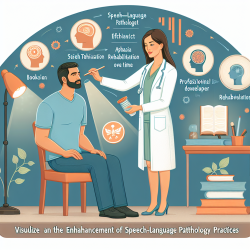The field of cochlear implants has seen remarkable advancements over the past few decades, significantly improving the quality of life for individuals with severe to profound hearing loss. The research article titled "Future Directions for Cochlear Implants" provides valuable insights into the latest findings and potential future improvements in cochlear implant technology and therapy practices. This blog aims to guide practitioners in integrating these research outcomes into their therapeutic approaches, thereby enhancing their skills and the outcomes for their patients.
Understanding the Current Landscape
Cochlear implants have revolutionized the way postlingually deafened adults and prelingually deafened children perceive sound. The variability in performance among users, however, underscores the need for continuous research and tailored therapeutic interventions. The advancements in signal processing, device adjustments, surgical procedures, and rehabilitation strategies have been instrumental in this journey.
Implementing Research Outcomes in Therapy
To further enhance the therapeutic outcomes for cochlear implant users, practitioners can focus on several key areas highlighted in the research:
- Signal and Noise Understanding: A deep dive into the acoustics of speech, background noise, and everyday sounds can aid in designing better signal processors and adjusting devices to individual needs.
- Optimizing Device Adjustments: Future improvements in cochlear implants involve personalizing device settings based on the unique auditory profile of each user. This requires a detailed understanding of how different settings affect speech perception and sound quality.
- Rehabilitation Techniques: The development of innovative rehabilitation programs that leverage new technology in audiovisual equipment can significantly enhance the speech perception abilities of cochlear implant users.
- Therapeutic Training: Encouraging practitioners to undergo specialized training in the latest rehabilitation strategies can ensure that they are well-equipped to address the diverse needs of their patients.
Future Directions in Cochlear Implant Therapy
The article sheds light on several areas that hold promise for the future development of cochlear implant technology and therapy:
- Improvements in understanding signals and noise, which can lead to more sophisticated signal processing techniques.
- Advancements in surgical procedures and device adjustments that cater to the individual auditory profiles of users.
- The integration of rehabilitation strategies that are more aligned with the technological advancements in cochlear implants.
By staying abreast of these developments and incorporating them into therapy practices, practitioners can significantly enhance the effectiveness of cochlear implants, leading to better speech perception and overall quality of life for users.
Encouraging Further Research and Collaboration
While the current research provides a solid foundation, there is still much to be explored in the realm of cochlear implants. Practitioners are encouraged to engage in ongoing research and collaborate with peers and industry experts to drive innovation in therapy practices. Networking at conferences, participating in webinars, and contributing to publications can facilitate this exchange of knowledge and ideas.
In conclusion, the future of cochlear implant therapy is bright, with numerous opportunities for practitioners to enhance their skills and improve patient outcomes. By leveraging the insights from recent research and staying engaged with the professional community, therapists can play a pivotal role in advancing this field.
To read the original research paper, please follow this link: Future Directions for Cochlear Implants.










